Kirk Hammett and David Karon talk KHDK guitar pedals
Metallica man putting pedals to metal

Introduction
As they unleash KHDK Electronics upon unsuspecting guitarists across the globe, Metallica’s Kirk Hammett and industry pro David Karon reveal their plans to shake up the effects pedal world
In between making movies, headlining festivals and recording a new album, you’d think Metallica’s longtime lead guitarist Kirk Hammett would struggle to fit any more on his plate.
The pair made waves with Hammett’s signature Randall amps, but KHDK Electronics affords them complete creative control
Yet when old friend and industry vet David Karon suggested a new venture - a pedal company - Kirk jumped at the chance. First introduced through Anthrax’s Scott Ian, the pair had already made waves with Hammett’s signature Randall amps, but KHDK Electronics affords them complete creative control, and provides the keys to unlocking the “unholy sounds” inside Kirk’s head.
With three pedals already under their belt - Kirk’s signature Ghoul Screamer, the No 1 Overdrive and No 2 Clean Boost - Kirk and David gave us the lowdown on why KHDK has them so excited…
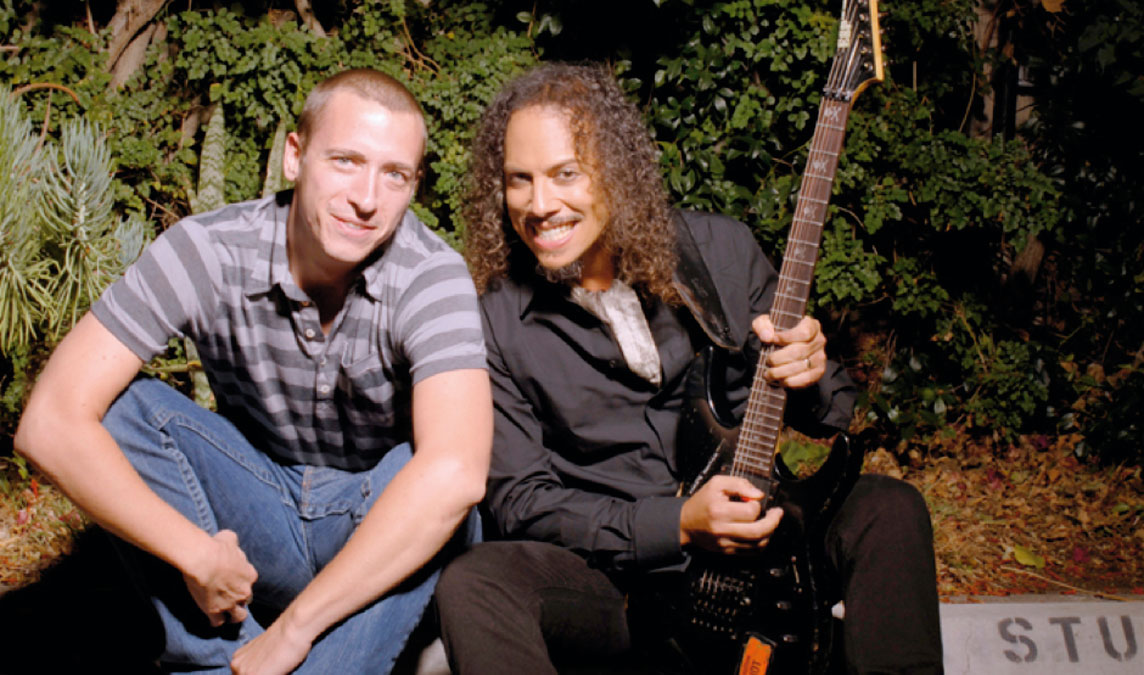
Kicking off KHDK
What made you want to start KHDK?
Kirk Hammett: “Well, it actually was not my idea to start a pedal company; it was the DK - Dave Karon - and we were just sitting around, talking about how much easier it is to do stuff these days because of the internet and computers and technology and whatnot, and all of a sudden, he said, ‘You know what? We should start a pedal company,’ and I said, ‘Good idea; let’s do it!’ [laughs]
I see it as another avenue of expression, and a good way to experiment with things
“It was along the lines of, ‘Let’s start a record company; people do it all the time!’ But when I agreed to start this pedal company, I realised that it’s not like a record company, and not a whole lot of people do it! [laughs]
“I see it as another avenue of expression, and a good way to experiment with things, and a good way to learn about other stuff, and I’m learning what the limits are and what limits can be broken, and we have some really super-cool ideas that we’re sitting on that will slowly come out, and I’m super, super-excited about it all. More excited than I ever expected to be, honestly.”
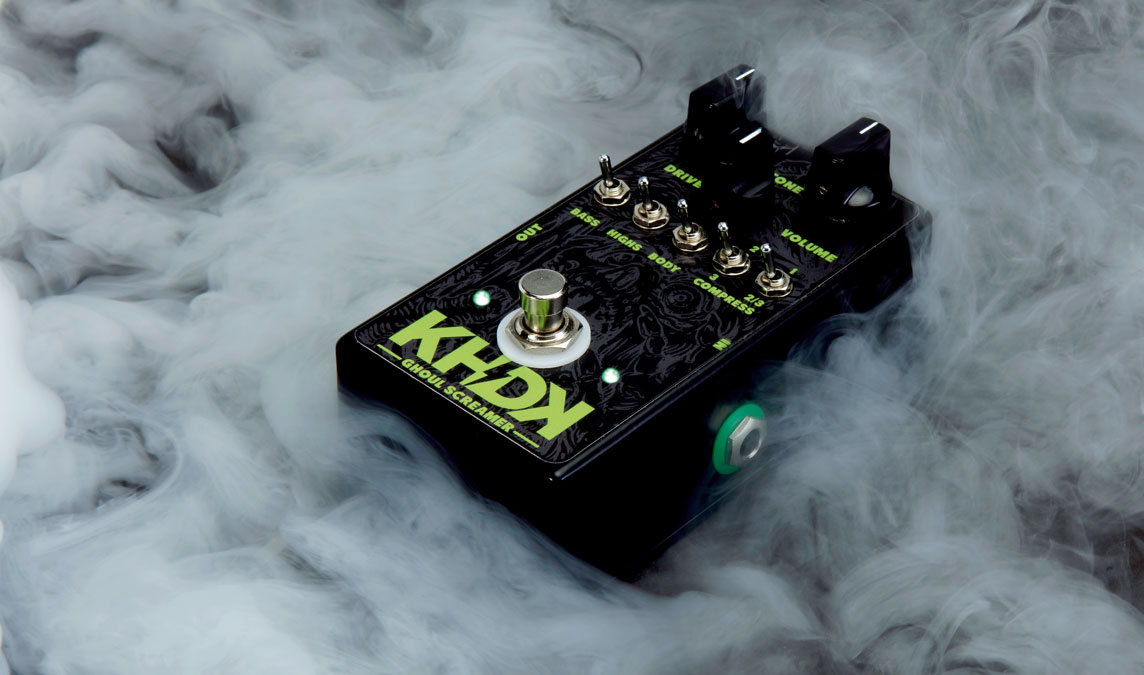
Ghoul gain
What was the thought process behind the Ghoul Screamer?
KH: “Well, I always thought that the Tube Screamer was great, and a classic sound, but after using one for 30-odd years or so, there have been other times where I’ve thought, ‘Wow, I wish I could get a little more bottom out of it,’ or, ‘if I could just compress it a little bit more for just this little situation,’ or, ‘if I could just get a little bit more of the Tube Screamer sound.’
“I really wanted to just open it up and try and expand the potential of it. And so we expanded every knob: we took the tone knob - added top, added middle, added bottom - we took the gain, and added some compression and ways to work with that. And so, basically, we added more to it.”
David Karon: “We increased a lot of the range of the pots - so, the gain pot has less gain in the minimum for more clean boost and more gain in the maximum. When you have the switches all up, it’s like a traditional 808 with high-end components, and then, when all the switches are down, the bass increases, the overdrive has more bottom-end, the highs widen, it sounds brighter.
“I’m sure that people out there are screaming, ‘Heresy! Why is he messing with such a classic sound?’
“The body switch is a mid-enhancer, so it makes it more present. And then the compression switch is like a headroom, so you have three versions of headroom: one being less, two and then three being the most. So, it’s to optimise the pushing of your tubes on your amp.”
KH: “I’m sure that people out there are screaming, ‘Heresy! Why is he messing with such a classic sound?’ I might be messing with a classic sound, but fucking hell, how are we gonna move forward if someone doesn’t cross the line somewhere?
“It’s like music: someone has to cross the line for it to get anywhere. Sometimes I feel like an anarchist, because I’m taking stuff and I’m asking Dave and our engineer Antonin [Salva], and saying, ‘Hey, well, can we do this?’ And they’ll say, ‘Well, we can do this,’ or, ‘If we do this, we’re gonna screw this up and won’t be able to do this’ and whatnot.”
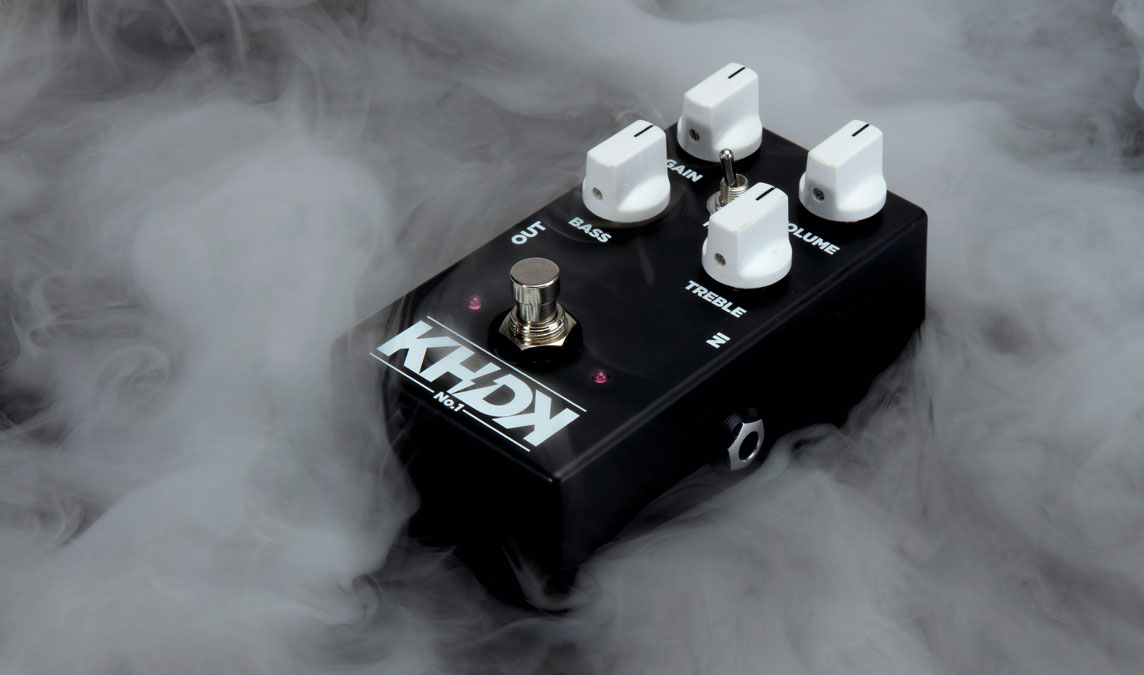
No 1 pedal
Have you used the pedal with Metallica yet?
KH: “You know, we haven’t really toured since it came out, but I’ve been using it in rehearsals, and I plan to use it while we record… I want to use everything that we’re making to just mix the whole recording process up; I want to use this stuff to shake it all up and start it in a different place. I just want a new starting spot.”
What was the thinking behind the No 2 Clean Boost and No 1 Overdrive?
If you hook up the No 1 pedal and the Ghoul Screamer together, oh my god, it’s just next level
KH: “Something that’s always needed is a clean boost. Always. If you’re a guitar player in a band and a riff is coming up and you want it to be loud and heavy, step on that clean boost. You’re in a band, and your guitar solo’s coming up? Step on that boost. It’s like air: you need oxygen to breathe; when you’re in a band, you need a boost. [laughs]
“The distortion pedal is based on this obscure pedal that I found in Europe that was only made for eight months or so, and then the maker just stopped making it. And I can understand why: he probably didn’t sell any, because it’s so over-the-top and weird. I had been using this particular pedal for a while, and it was starting to show signs of breaking down, so it was imperative for us to design something along those lines.
“We made it a little bit quieter, a little bit more usable, a little bit more functional. I love how the distortion turned out; and if you hook up the No 1 pedal and the Ghoul Screamer together, oh my god, it’s just next level. Watch out, because it’s an unholy sound!”
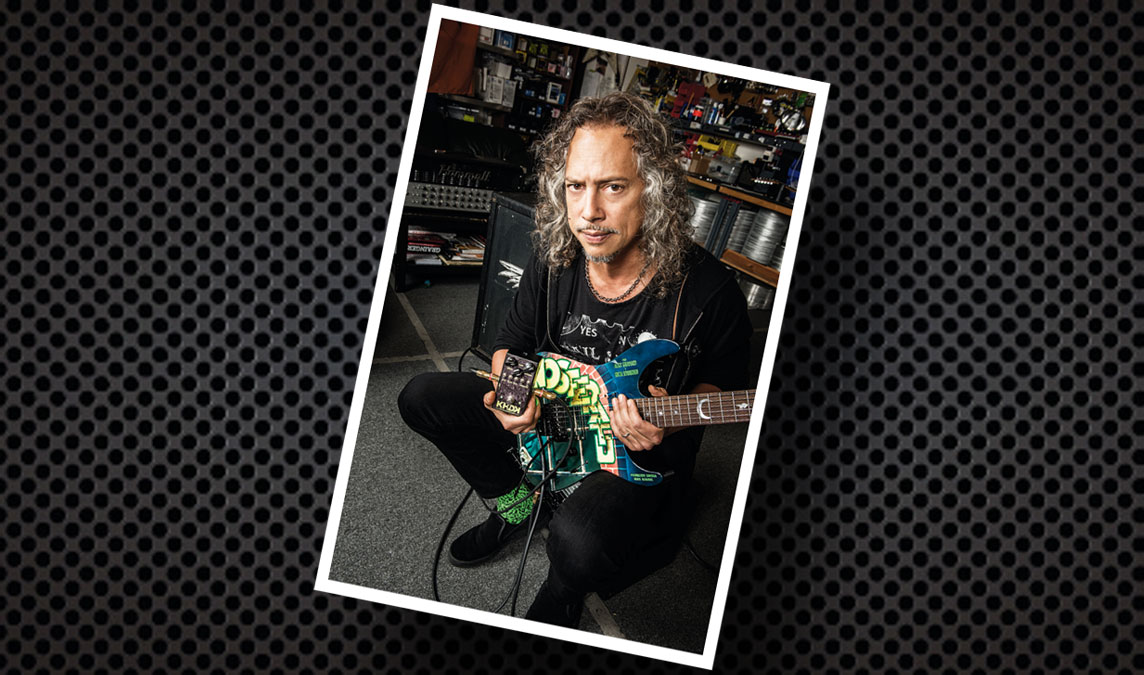
Fuzz factor
What other products can we expect?
KH: “Well, I have a lot of great ideas, and I’m really afraid to mention them right now, because someone else might jump on top of them! So, at this point, I really can’t say very much, but without a doubt, I’m guaranteeing you that some of the stuff that’s going to be coming out in the next year or two is gonna be pretty different, radically different.”
We’ve got 15 different products in the works - I’m sending a couple of fuzz pedals out to Kirk today for testing
DK: “We’ve got 15 different products in the works - I’m sending a couple of fuzz pedals out to Kirk today for testing. We go through a lot of ideas. Our biggest limitation is staying analogue, so some of the ideas we’re still trying to achieve in an analogue format - we don’t want to jump into the digital world yet!”
We have to ask: is there a wah coming?
KH: “Well, of course! I mean, come on: look who you’re talking to! [laughs]”
You sent pedals out to the likes of Joe Duplantier, Dan Donegan and Rob Caggiano; why did you choose those players in particular to test them out?
DK: “Kirk and I are both just massive fans of Gojira, and they’re just such great guys to work with, and Joe has just got such an intricate, different approach to guitar playing, and Kirk’s great friends with him, so he was an immediate choice.
“Dan and Rob I’ve been working together for almost 15 years now, so they’re really great friends, very trusted ears for me that will be honest with whatever we’re doing and just say it like it is, and not just try to candy-coat anything. The honest voice is what we need, and they have really discerning taste for their tone.”
KH: “The great thing is that they’re just loving it. John 5 just shot me a text, and I said, ‘Hey bro, I’ll send you whatever you need.’ ’Cos he’s a good friend of mine, too. My goal is to outfit all my friends, for sure! [laughs]”
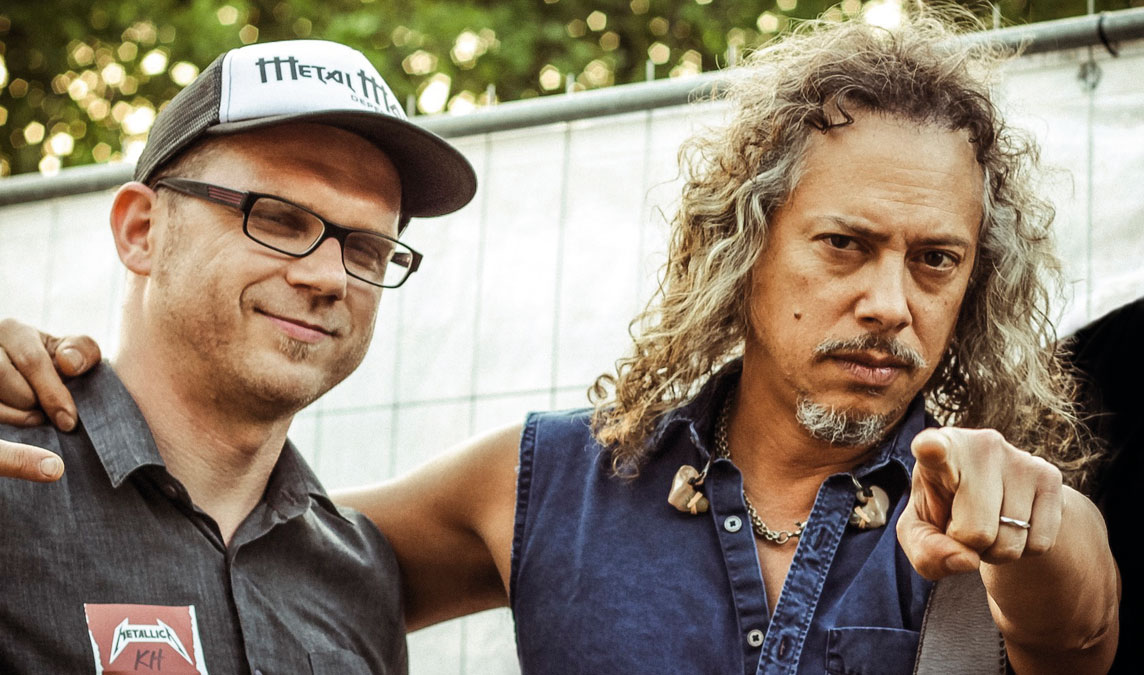
Building a legacy
What are your ambitions for the company?
DK: “This is something we want to leave to our children - I mean, obviously, Kirk has a massive legacy - but he wants to leave this company as a legacy, as do I, and we have major plans: we’re looking at releasing at least a few more pedals in 2016. We have at least five that are potentially ready to go.”
I’m just really inspired, and hopefully through my inspiration and my excitement, it’ll catch on with other players
KH: “We’re all very inspired and very, very excited about this. I think it’s the first time you’ll see a pedal company actually being driven by an actual guitar player, like Tom Scholz and Rockman - I really don’t know of any other guitar players out there who are actually making pedals.
“I know there are a lot of guitar players out there making amps, there are a lot of guitar players out there making guitars and whatnot, and a lot of players out there endorsing stuff, but the fact that I’m making pedals, and we’re trying to just mix it all up, it’s fun for me and it’s super-cool, and Dave and I are really, really enjoying it.
“It’s a big surprise, and I’m just really inspired, and hopefully through my inspiration and my excitement, it’ll catch on with other players and we can just spread the good, good vibe.”
Mike has been Editor-in-Chief of GuitarWorld.com since 2019, and an offset fiend and recovering pedal addict for far longer. He has a master's degree in journalism from Cardiff University, and 15 years' experience writing and editing for guitar publications including MusicRadar, Total Guitar and Guitarist, as well as 20 years of recording and live experience in original and function bands. During his career, he has interviewed the likes of John Frusciante, Chris Cornell, Tom Morello, Matt Bellamy, Kirk Hammett, Jerry Cantrell, Joe Satriani, Tom DeLonge, Radiohead's Ed O'Brien, Polyphia, Tosin Abasi, Yvette Young and many more. His writing also appears in the The Cambridge Companion to the Electric Guitar. In his free time, you'll find him making progressive instrumental rock as Maebe.


